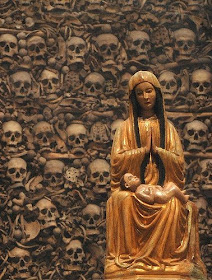Benedict left a Regensburg type time bomb for Francis in the canonization
of some obscure political military incident in the fifteenth century. Some ethnic cleansing in the overlapping
geography of east and west and in the distant past.
John Paul II started this process and
Benedict put his seal of approval on the worship of the bones of 800 victims of
war in an Italian Cathedral.
Benedict’s
hatred of Islam was displayed in 2006 for which he gave a PR apology to
outraged Muslims of the present era, the twentieth century, as opposed to
current RCC time in the 1480s etc.
…written in 1391 as an expression of the views of the Byzantine emperor Manuel II Palaiologos, one of the last Christian rulers before the Fall of Constantinople to the Muslim Ottoman Empire, on such issues as forced conversion, holy war, and the relationship between faith and reason. The passage, in the English translation published by the Vatican, was:
Show me just what Muhammad brought that was new and there you will find things only evil and inhuman, such as his command to spread by the sword the faith he preached.
(Benedict XVI – Regensburg Lecture – 12 Sept 2006 / Wikipedia)
Pope Francis is preparing to canonise an estimated 800 Italian laymen killed by Ottoman soldiers in the 15th century. The canonisation service will be on May 12 in St Peter’s Square and it will be the first carried out by the Pontiff since he was elected in early March.
The killing of the martyrs by Ottoman troops, who launched a weeks-long siege of Otranto, a small port town at the most eastern tip of southern Italy, took place in 1480.
When Otranto residents refused to surrender to the Ottoman army, the soldiers were ordered to massacre all males over the age of 15. Many were ordered to convert to Islam or die, but Blessed Antonio Primaldo, a tailor, spoke on the prisoners’ behalf. “We believe in Jesus Christ, Son of God, and for Jesus Christ we are ready to die,” he said, according to Blessed John Paul II, who visited Otranto in 1980 for the 500th anniversary of the martyrs’ deaths.
Primaldo inspired all the other townspeople to take courage, the late Pope said, and to say: “We will all die for Jesus Christ; we willingly die so as to not renounce his holy faith.” There were not “deluded” or “outdated,” Blessed John Paul continued, but “authentic, strong, decisive, consistent men” who loved their city, their families and their faith.
The skulls and other relics of the martyrs currently adorn the walls around the altar of Otranto Cathedral as a memorial to their sacrifice.
.
